
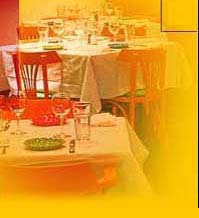

|
|
|
CHHATRAPATI Shahu, the 15th descendant of the great Maratha warrior king Chhatrapati Shivaji, is better known as the Maharaja of Kolhapur. He is royal by blood, lives in an rambling palace (Naveen Rajwada) in the heart of Kolhapur, but his lifestyle and tastes are downright simple. I recognised this within minutes of meeting him for coffee on the grounds of his palace.
Our meeting had been fixed for 9.30 o�clock on a Sunday morning. I reached on time. But the Maharaja was not yet ready for me. So a royal servant invited me to have a look at the palace zoo. I declined and settled to wait for the Maharaja in the palace canteen instead. Minutes later he drove up in a silver Santro, himself at the wheel, his pet German shorthead pointer Rambo gambolling besides the car.
He selected a chair that backed a cluster of bamboo trees, called Rambo to heel, and ordered coffee for us. In the distance, the clock in the tower of the palace struck the quarter hour, a deep chime that reminded me of the Big Ben. It was to do that every 15 minutes, loud and spaced out, and I marvelled that the Maharaja could sleep at night with this racket outside his bedroom window. Not that Chhatrapati Shahu looked sleepy. He was clear-eyed and wide awake, a brown-skinned Maratha, 56, and of robust build and good health.
The Maharaja grinned toothily when I asked him about food. �I eat simple Kolhapuri food,� he said. �It is generally non-vegetarian, extremely spicy, and the popular dishes are Tambada Rassa and Pandhara Rassa. These are mutton and chicken curries. There�s nothing more to it.� I could see I had my work cut out for me. �Are you particularly fond of meat,� I prodded him. �You could say the culture of eating meat is very old in our family,� he replied guardedly. �Perhaps it was easy to get meat in the olden days.�
My interview was not going the way I wanted it to. �Wasn�t there a culture of game food in Kolhapur,� I asked Chhatrapati Shahu, hoping to get to the real meat. �There was,� he replied, �but it is now banned. The Kolhapur maharajas in the tradition of the warrior kings before them, often went out on shikars in which they hunted wild boar, partridge, hare, black buck, that kind of wild life that had the run of the palace grounds. This continued till the early 1970s when the government of India banned hunting for food.�
�What about you,� I asked. �Oh, I liked wild boar too,� the Maharaja answered heartily. �And now that game food has been banned, the people of Kolhapur have learnt to use to the wild boar pickle recipe for the preparation of mutton. It is the same formula, but the tastes are totally different, you cannot compare the two.� I asked him, �What happened to all the wild life after hunting was banned?� �It�s still there,� the Maharaja answered, �and increasing! Except the black buck. There used to be so much of that in Kolhapur in the 1950s, but now I don�t see it anymore, I hear the flock has increased in Ahmednagar.�
I was keen to know what he had eaten in Africa. �Game food, naturally,� Chhatrapati Shahu said. �Antelope, no crocodile and ostrich. Though I don�t know whether I would have eaten this meat if it had been offered to me. I cannot say that I have consumed a great number of exotic foods, either. Like elephant, or dog, and even monkey�s brain, things like that. In fact, I would not be very particular about seeking out this kind of food too.�
I asked him whether he could cook. The Maharaja looked astonished. �I can�t,� he said flatly. �I can�t even make tea or an omelette. Whatever gave you the idea! Even when I was in college, I studied at Indo-Christian College in Bangalore, a small house was made available to me with a cook.� And he was not much of a restaurant person, too. �Give me Indian food, masala dosa, tandoori chicken, and I don�t need another cuisine. So I don�t have a favourite cuisine nor restaurant.
But I can eat Chinese food better than Continental.�
And we talked about Chhatrapati Shivaji. The Maharaja had no idea whether the great Maratha warrior king enjoyed good food. Or whether he was fond of shikar. �I don�t think he had the time for that,� he said, grinning at his own joke. �Though shikar was a sport practised by everyone and Shivaji�s father, Shahaji, died at 70 in a hunting accident while spearing a wild boar from horseback. Those were the days! Things are different now. I get by with little physical activity. Like a small walk or a trek in the Sahyadris.�
|

Home Page
About the mag
Subscribe
Advertise
Contact Us

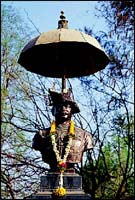 The Grand Maratha
The Grand Maratha
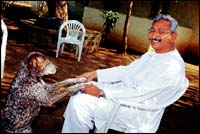 The Maharaja was dressed in an ordinary white kurta-pyjama, the kind I might have worn to bed, and had Kolhapuri slippers on his feet. Why not, I thought. If you are in Kolhapur and happen to be the King, why not wear the footwear that the city is famous for! As he walked into the canteen, men and women who had been busy tending to his gardens touched their foreheads to the ground in reverence. The Maharaja acknowledged their respect for him with a nod of his head.
The Maharaja was dressed in an ordinary white kurta-pyjama, the kind I might have worn to bed, and had Kolhapuri slippers on his feet. Why not, I thought. If you are in Kolhapur and happen to be the King, why not wear the footwear that the city is famous for! As he walked into the canteen, men and women who had been busy tending to his gardens touched their foreheads to the ground in reverence. The Maharaja acknowledged their respect for him with a nod of his head.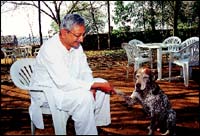 I asked how it felt to be Chhatrapati Shivaji�s 15th descendant, and the Maharaja shrugged dismissively. �I just happen to have that background,� he said. Which was not what I was expecting to hear, of course, but I let it pass. I was there to find out about Chhatrapati Shahu�s eating and drinking habits, whether he was any kind of gourmet, and if it was true that the royal cooks in his palace kitchen still followed recipes compiled by his maternal grandfather over a century ago.
I asked how it felt to be Chhatrapati Shivaji�s 15th descendant, and the Maharaja shrugged dismissively. �I just happen to have that background,� he said. Which was not what I was expecting to hear, of course, but I let it pass. I was there to find out about Chhatrapati Shahu�s eating and drinking habits, whether he was any kind of gourmet, and if it was true that the royal cooks in his palace kitchen still followed recipes compiled by his maternal grandfather over a century ago.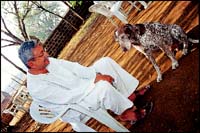 �But what about vegetarian fare,� I asked. �Isn�t there a Brahmin menu in Kolhapur?� The Maharaja considered this one. �Look,� he said, �the Brahmins here eat quite a lot of meat. And there�s no reason why they shouldn�t. Of course, there are many who are purely vegetarian. We Marathas must have some vegetarian fare in our menus as well. It�s not as if we eat meat all the time.� But his meals were simple, Tambada Rassa and Pandhara Rassa with bhakris, rice and dal, some chutney. He did not mind a dessert now and then but did not have a sweet-tooth.
�But what about vegetarian fare,� I asked. �Isn�t there a Brahmin menu in Kolhapur?� The Maharaja considered this one. �Look,� he said, �the Brahmins here eat quite a lot of meat. And there�s no reason why they shouldn�t. Of course, there are many who are purely vegetarian. We Marathas must have some vegetarian fare in our menus as well. It�s not as if we eat meat all the time.� But his meals were simple, Tambada Rassa and Pandhara Rassa with bhakris, rice and dal, some chutney. He did not mind a dessert now and then but did not have a sweet-tooth.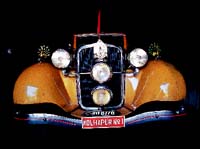 The Maharaja remembered those days well. �Wild boar was the most relished meat,� he recollected. �We used to hunt it in the forests of the Sahyadri hills as well. But by the time I started going out on shikars, the tradition was coming to an end. I, of course, have hunted for everything. Not on elephant back or horse back. But on foot! And the wild boar... it was everybody�s favourite game food. We used to consume it as a curry. A pickle was made of its meat, too, which stayed for days. The royal families preferred the pickle because refrigeration was not common and easily available everywhere.�
The Maharaja remembered those days well. �Wild boar was the most relished meat,� he recollected. �We used to hunt it in the forests of the Sahyadri hills as well. But by the time I started going out on shikars, the tradition was coming to an end. I, of course, have hunted for everything. Not on elephant back or horse back. But on foot! And the wild boar... it was everybody�s favourite game food. We used to consume it as a curry. A pickle was made of its meat, too, which stayed for days. The royal families preferred the pickle because refrigeration was not common and easily available everywhere.� This Maharaja of Kolhapur is in favour of the ban on shikar being lifted, provided, of course, the hunting is regulated. �In Africa they have plenty of safaris, some for hunting purpose, some for photographic. And both are doing well. That pattern could be worked out here too,� he explained. He had travelled to Africa himself, but not to hunt, he had gone as any other tourist. �Not even to take photographs like they show you people do on National Geographic channel. I was quite amateurish.�
This Maharaja of Kolhapur is in favour of the ban on shikar being lifted, provided, of course, the hunting is regulated. �In Africa they have plenty of safaris, some for hunting purpose, some for photographic. And both are doing well. That pattern could be worked out here too,� he explained. He had travelled to Africa himself, but not to hunt, he had gone as any other tourist. �Not even to take photographs like they show you people do on National Geographic channel. I was quite amateurish.� 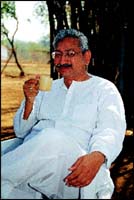 We talked about other things. Like whether he classified as a gourmet or not. �I say I don�t,� the Maharaja declared obstinately. �Though my tastebuds are sensitive, I can identify tastes, make suggestions to the cook. But I believe it is not necessary to have good food all the time. My palace kitchen is a modern-traditional set-up. I have a few cooks who are experts at making Kolhapuri food. They follow a cookery book compiled by my maternal grandfather in the century before last. The lady of the palace, my wife Maharani Yadnaseni, directs them. But there isn�t much cooking to do, really. We don�t have royal banquets as you may imagine them to be. When people call, we offer them simple lunch or dinner, it�s just a get-together.�
We talked about other things. Like whether he classified as a gourmet or not. �I say I don�t,� the Maharaja declared obstinately. �Though my tastebuds are sensitive, I can identify tastes, make suggestions to the cook. But I believe it is not necessary to have good food all the time. My palace kitchen is a modern-traditional set-up. I have a few cooks who are experts at making Kolhapuri food. They follow a cookery book compiled by my maternal grandfather in the century before last. The lady of the palace, my wife Maharani Yadnaseni, directs them. But there isn�t much cooking to do, really. We don�t have royal banquets as you may imagine them to be. When people call, we offer them simple lunch or dinner, it�s just a get-together.�